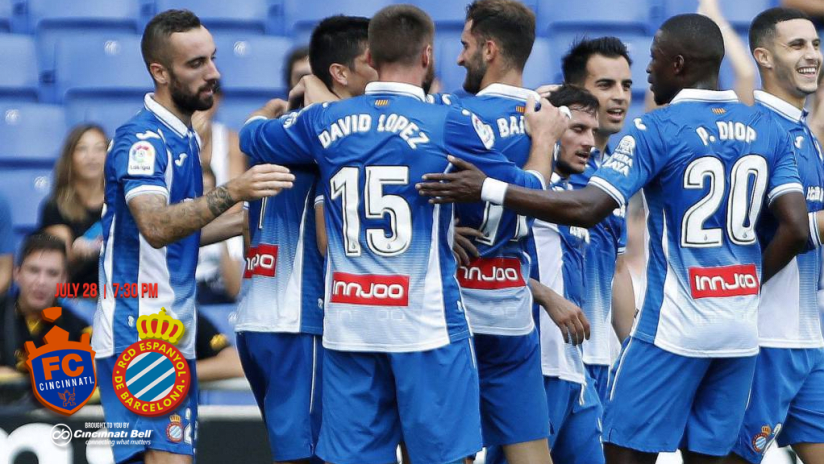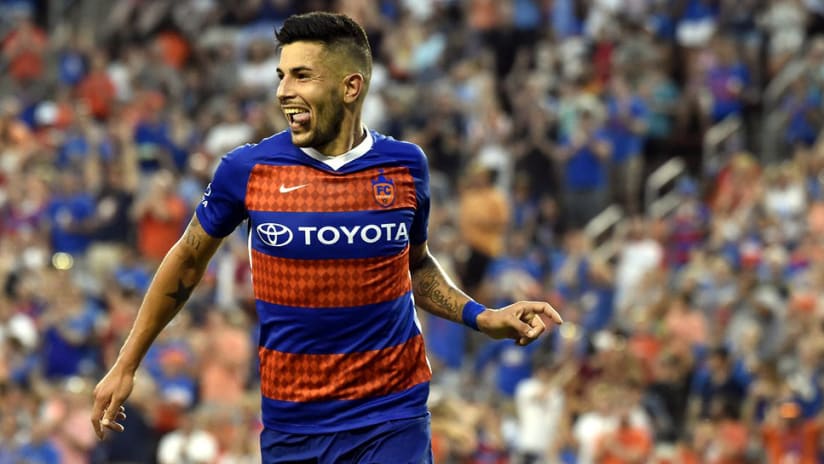Reial Club Deportiu Espanyol de Barcelona, more commonly known as RCD Espanyol or just Espanyol, might not be as well-known as their La Liga rivals Real Madrid CF or their in-city rivals FC Barcelona. But the other team from Barcelona has a rich tradition in the beautiful game of their own that stretches back over a century, making the July 28 friendly against FC Cincinnati a unique story.
Much of the club's modern-day identity is shaped by the region from which it hails: Catalonia.
One of Spain's most wealthy and visited regions, Barcelona is the spiritual home of a historically independent – and fiercely proud - Catalonian identity.
During the course of RCD Espanyol's history, the life and politics between its native Catalonia and the Castile region -- where the Spanish capital of Madrid is located -- has had a pretty profound impact on the club.
Take the club's name for example, which it has gone by several since its founding in 1900. Espanyol was founded as "Sociedad Español de Fútbol," a Castilian Spanish spelling. Early financial troubles forced the club to close its doors after just six years, but it was soon reborn as "Club Deportivo Español" in 1909. Just three years later, its moniker was modified once again to "Real Club Deportivo Español" upon receiving royal patronage from Madrid-based King Alfonso XIII in 1912.
Alfonso XIII would also have a hand in the club's third name change, when the club temporarily adopted the more Catalan-friendly name "Club Esportiu Espanyol" following the King's abdication in 1931. The name would later revert back its Castilian spelling after the end of the Spanish Civil War. But in 1995, a Catalan spelling was once again adopted, settling on Reial Club Deportiu Espanyol. Or for short, "Espanyol."
The club's colors have also been diverse. They originally donned yellow, a color common to Catalonia and Castile. But upon reforming in 1910, they adopted blue and white from the family crest of a Middle Ages naval commander native to the region. Though they wear those same colors today, the red and yellow still have a presence as well in their club crest.
No matter the name or colors, however, Espanyol have been an ambitious side from their inception.
Prior to the establishment of Spain’s top-flight league, the club was one of the finest sides in Catalonia. They won the Campionat de Catalunya 11 times between 1904 and 1940, second only to FC Barcelona. Since becoming a charter member of La Liga in 1929, the club has spent 80 seasons in the top flight. They've also won the national knockout tournament, the Copa del Rey, four times -- most recently in 2006.
Espanyol has also made headlines on the European stage, twice finishing as runners up in 1987-88 and 2006-07 in what’s now known as the UEFA Europa League.
Even without a trophy cabinet stocked full of recent glories, Espanyol has made a name for itself with the quality of talent it’s helped to usher on to the world's stage. Legendary goalkeeper Ricardo Zamora got his start at Espanyol, and the top goalkeeper in Spain each season is now awarded a trophy bearing his name. Club legend Raúl Tamudo was a fixture on the Spain National Team in the early 2000s and is Spain’s all-time leader in appearances and goals with 340 and 129, respectively.
More recently, those familiar with the Premier League will recognize the name of former Espanyol manager and player Mauricio Pochettino, who now commands Tottenham Hotspur FC.
The club also relies heavily on its youth academy to produce local Catalonian talent for their first team. Currently, seven players in their first team are graduates of their "cantera."
These days, stars like defender and captain Javi López, midfielder Victor Sánchez and forward Sergio Garcia entertain fans at the 40,500-seat RCDE Stadium. And with new manager Rubi having just taken charge, it's possible Espanyol could have some new stars in their ranks by the time they make it to Cincinnati in late July.
Regardless of who is pulling on the shirt, the team is affectionately referred to as Los Perequitos -- "the parakeets" -- by their followers. The origin of the nickname is unknown, with competing theories ranging from the birds frequenting the neighborhood in which the Espanyol originally played to another relating to popular 1920s cartoon character Felix the Cat.





